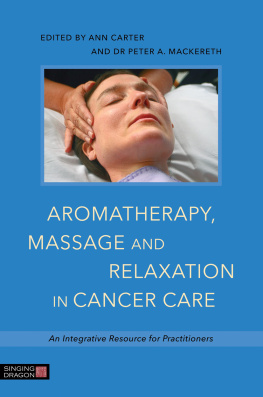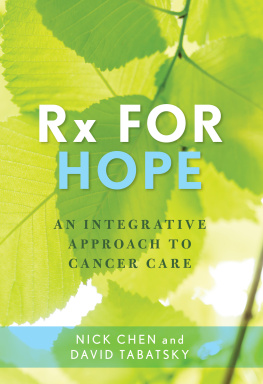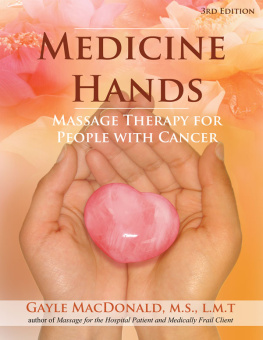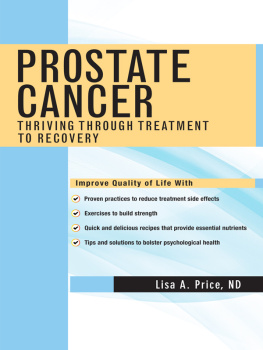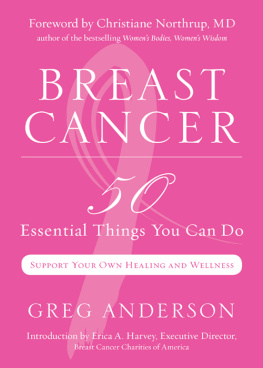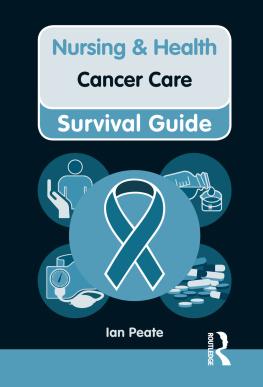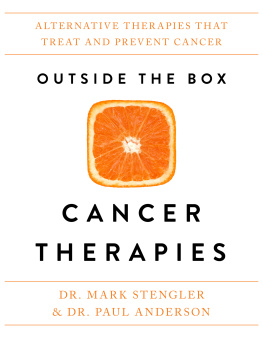
AROMATHERAPY,
MASSAGE AND
RELAXATION
IN CANCER CARE
An Integrative Resource for Practitioners
EDITED BY ANN CARTER
AND DR PETER A. MACKERETH
FOREWORDS BY ANNE CAWTHORN AND DEBORAH COSTELLO

LONDON AND PHILADELPHIA
CONTENTS
FOREWORD
Anne Cawthorn
I was delighted to be asked to write a foreword to this book, not least because of my personal and professional journey with Peter and Ann as we have integrated complementary therapies into healthcare over the past 25 years. Although the therapies covered in this book are now adopted into the field of cancer and palliative care, this has not always been the case.
In the early days of introducing therapies I certainly recall sleepless nights, with many clinicians unconvinced as to the benefits of complementary therapies, and others worried about causing patients harm. Over the years much work has gone into changing hearts and minds. This has taken the form of education, research and dissemination of good practice and even some receiving therapies to experience the benefits for themselves.
Education was one of the first obstacles to overcome, due to the lack of specialized courses in healthcare. Undaunted, the team developed therapy courses for those working in healthcare. The most important aspect of these courses has been to help therapists learn how to adapt and modify the therapies to safely meet the needs of patients living with cancer. Peter, Ann and the team have continued to further develop courses based on their innovative practice and have tirelessly disseminated this to others in the field of cancer care.
Through published service evaluations and research, they have provided much-needed evidence to underpin their clinical work. However, by far the greatest validation of the therapies has come from the patients and carers themselves. They have been instrumental in winning over clinicians as to the value of therapies in helping with the pain and symptoms relating to the disease and subsequent treatments, as well as improving resilience and wellbeing.
This book should prove an invaluable resource to any practitioner working in the field of cancer care who is interested in learning how research-based innovative therapies can be safely integrated into practice to enhance the care of patients and their carers.
Anne Cawthorn MBE, MSc, BSc, RN
FOREWORD
Deborah Costello
My name is Deborah Costello; I was 52 years old and came across a lump on my neck. I visited my GP and was referred to my local hospital to see what this was. The lump was removed under general anesthetic, and two weeks later I had the news that I needed to attend a cancer hospital for treatment. After a bone marrow biopsy and CT scan, the devastating news was given to me: I had chronic lymphocytic leukaemia.
After my first chemotherapy, I was given a large amount of take-home drugs, some of which I was dreadfully allergic to. I returned to the hospital and was introduced to Dr Jacqui Stringer (one of the contributors). She helped me make friends with the drugs that my body so very much needed.
Apart from my fabulous doctors and nurses, much-needed support came from the complementary therapy service, based on the Haematology Unit. As well as massage, I was introduced to aromasticks, where the scents trigger memories and allow the mind to rest and focus on alternatives to what treatment is being given, such as chemotherapy. The Stretchy Man (a little rubber man with stretchy arms and legs) was used as a kind of stress ball. My Stretchy Man became known as Peter, after Dr Peter A. Mackereth (co-editor of this book). It allowed me to picture his calm and soothing voice. I also experienced regular massages and creative imagery sessions while waiting for scans and tests.
In December 2010, I had the great news that I was in remission. Unfortunately in December 2011, my disease was back. I was told I needed a life-saving transplant. Again complementary therapies helped me enormously in dealing with this news. Hypnotherapy, acupuncture and massage all helped to keep my mind and body in good condition while waiting for a suitable donor. In November 2012, I received a bone marrow transplant. Complementary services were with me at every step of my recovery. This service was truly invaluable.
I was so pleased to hear that Ann and Peter had edited a new book about complementary therapies. As a service user I was also delighted to be asked if I could be involved through writing a foreword. I have met some of therapists involved in this book and I know they are committed to the use of complementary therapies in cancer care. I hope this book can help students and qualified therapists to develop their skills, so that more people affected by cancer can be assisted. The book will be an invaluable resource for anyone who wants to help improve the quality of life for people like me and my family.
Deborah Costello
DISCLAIMER
Complementary therapy practices are constantly evolving in response to research, service evaluations, needs of patients (and carers) and concurrent development in medical practice. It is the responsibility of the therapist to maintain professional development and to work within the policies and practices in the context of his/her own clinical and private practice. The contributors and publisher are not responsible for any harm or damage to a person, no matter how caused, as a result of information shared in this book.
INTRODUCTION AND AN
OVERVIEW OF THE BOOK
The numbers of people being diagnosed and living with the consequences of cancer and its treatments are growing. Complementary therapy provision is expanding in public and private services, with the need to safely adapt therapeutic skills built on evidence-based knowledge to meet the challenges of clinical and private practice. People living with and recovering from cancer treatment drive the development of quality care, with therapists having accountability and responsibility to hone their practice to be effective and compassionate. Empathic responses include an appreciation of the physical, emotional and spiritual complexities of a cancer diagnosis and its consequences. No cancer journey is the same for every individual, their families and friends; we need to be mindful to their uniqueness, be in the moment and skilfully adapt our interventions.
Within this book we have brought together skilled and experienced contributors to link theory with practice, with the purpose of enriching the quality of complementary care offered in cancer services. Patient choices and therapist options are key elements that can come together like the pieces of a jigsaw puzzle to make a therapeutic interaction a meaningful, holistic experience. Patients, carers, multidisciplinary colleagues and therapists, working together and sharing experiences, can effect change in terms of service provision, understanding and the valuing of complementary therapies. Contributors to this book are involved in a variety of complementary therapy and cancer care settings, sharing a plethora of approaches, techniques and adaptions to equip novice and experienced practitioners in expanding their therapeutic toolbox.
In seeking and selecting this book for your development and studies, we recognize that you are engaged in a process of exploration and discovery. We hope that within these pages the content will assist you in becoming even more creative in maximizing your therapeutic skills. We recognize that this book is part of a worldwide movement to acquire the necessary evidence and experience to enable greater interaction and appreciation of complementary therapy approaches to cancer care.
Next page
